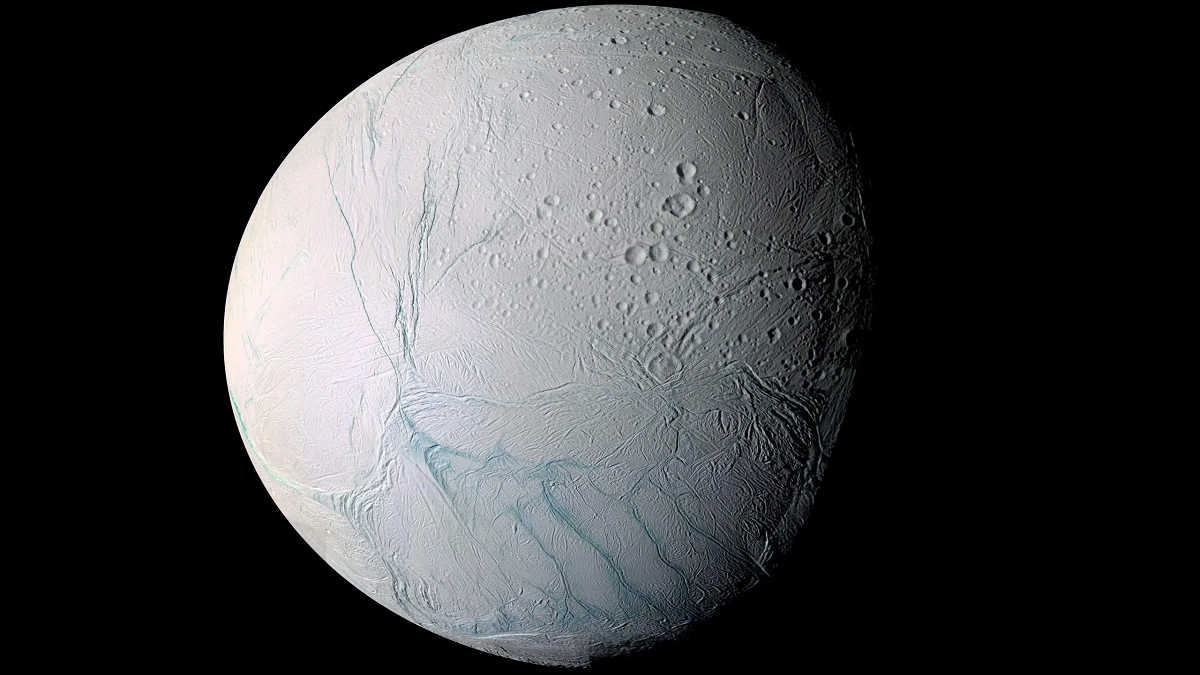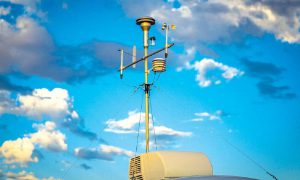In a remarkable advancement, a global team of scientists, spearheaded by Professor Frank Postberg of Freie Universität Berlin, has uncovered a critical building block of life beyond our planet. Pakistani-born scientist Dr Nozair Khawaja was instrumental in this pioneering achievement.
Dedicated to unraveling the mysteries of the cosmos and the pursuit of extraterrestrial life, the team concentrated their investigations on Enceladus, Saturn’s icy satellite.
Examining data sourced from NASA’s Cassini spacecraft, the researchers made a sensational discovery – the detection of phosphorus, a vital yet rare element essential for life, within the extraterrestrial ocean beneath Enceladus’ icy surface. This marked the first discovery of phosphorus in an extraterrestrial environment.
This groundbreaking research was unveiled in the scientific journal Nature on June 14, 2023.
“The results indicate a significant presence of phosphates in the ocean water of Enceladus. Our geochemical experiments provide an explanation as to why its ocean is highly enriched with this vital compound compared to Earth’s ocean,” Professor Postberg explained in a communication with The Express Tribune.
Read More: Astronauts suffer decades of bone loss from months in space
The Life-Supporting Sextet
Phosphorus is integral to life on Earth, forming the backbone of DNA, RNA, and fertile soil. Its identification on Enceladus completes the checklist of life-sustaining elements, positioning Enceladus as a prime candidate for life beyond Earth.
“The discovery of phosphates on Enceladus signifies the presence of all six bio-essential elements (Carbon, Hydrogen, Nitrogen, Oxygen, Phosphorus, and Sulphur) necessary for life,” stated Dr Khawaja, the coauthor of the study.
On Earth, phosphorus, in its phosphate form, is essential to DNA and RNA and often serves as a growth-limiting factor in diverse ecosystems. It’s an indispensable component of life as we understand it.
“This extraordinary breakthrough positions Enceladus as a leading contender in the solar system for the search for extraterrestrial life. Consequently, it necessitates the deployment of a new space mission equipped with cutting-edge technology to verify whether this habitable alien ocean world truly harbours life,” Khawaja elaborated in an interview with The Express Tribune.
The Cosmic Particle Detective
Enceladus, Saturn’s sixth-largest moon, modestly spans only 500km in diameter. The fruitful exploration of this fascinating celestial body was enabled through the tireless endeavors of NASA’s Cassini spacecraft, which reached Saturn successfully in 2004.
Over the span of its mission, Cassini collected an astounding 453,048 images of Saturn and its moons, executed 162 targeted flybys, and even discovered six new moons. The spacecraft transmitted an invaluable 635 GB of data that has been pivotal to the generation of 3,948 research papers.
Although Cassini’s mission culminated in a planned descent into Saturn’s atmosphere, the legacy of its data will continue to foster scientific enquiry for years to come.
In 2005, the Cassini spacecraft reported the astonishing observation of water vapor plumes jetting from the icy crust of Enceladus, suggesting the existence of a vast underground ocean.
The Cosmic Dust Analyzer (CDA), an ingeniously designed rotating instrument, was used to procure valuable samples of these ice grains and vapors. The CDA’s sophisticated sensors provided critical data on the properties of these particles, illuminating the nature of Enceladus’ environment and its hidden secrets.
Between 2004 and 2008, the researchers scrutinized spectra from 345 ice grains in Saturn’s E-ring and found phosphates in nine of those grains. The E-ring of Saturn is composed of ice grains escaping from Enceladus’s plume and subsequently orbiting Saturn.
Dr Nozair Khawaja made substantial contributions to this discovery as part of the team.
The Carbonated Ocean
Judging by the phosphate levels in the icy grains, Enceladus’s waters could contain 100 to 1,000 times more phosphorus. Laboratory experiments conducted on Earth corroborate the plausibility of such phosphate-rich conditions in Enceladus’s ocean, suggesting that its vast ocean shares similarities with carbonated drinks in its richness of dissolved carbonates.
In recent history, Dr Khawaja spearheaded international research teams in uncovering organically relevant compounds in ice grains emerging from Enceladus’s Ocean, further propelling the hypothesis of Enceladus’s Ocean harboring microbial life. These findings have been published in Nature and Monthly Notices of the Royal Astronomical Society (MNRAS), hinting at the need for further exploration of Enceladus in future missions.
A celebrated planetary scientist of Pakistani descent, Dr Khawaja is currently based at Freie University Berlin in Germany. He has contributed significantly to a number of landmark research projects, including NASA’s Cassini space mission and the upcoming Europa Clipper mission.
Dr Khawaja also co-investigates the Destiny Dust Analyzer (DDA), a part of JAXA’s Destiny Plus space mission investigating the asteroid Phaethon, and is part of a BioSign project conducting experiments at the International Space Station (ISS) to aid future space missions in the search for life on Mars and icy moons. He is also the principal investigator of a newly established hydrothermal facility at Freie University Berlin.
In addition to these ventures, Dr Nozair Khawaja is the founder of the Astrobiology Network of Pakistan (ABNP), working on various international projects related to astrobiology and promoting astrobiology and space exploration in Pakistan.























